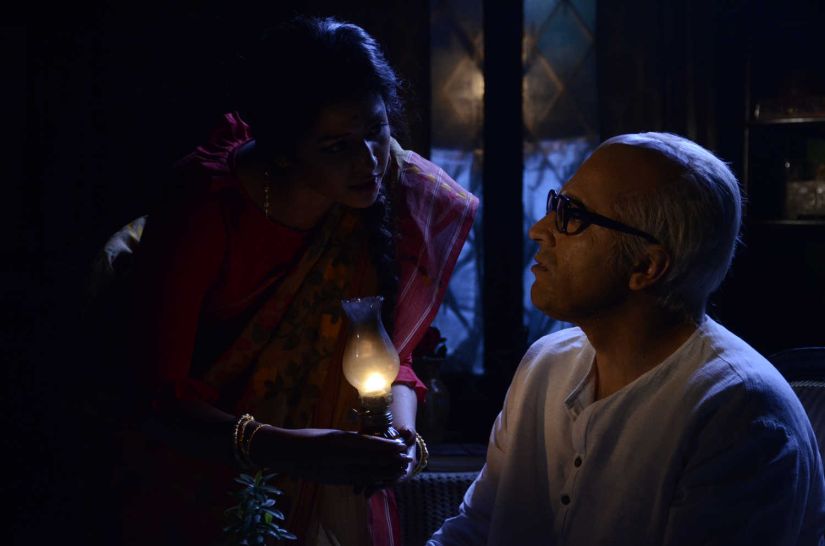Bengal has a rich history of detective fiction and among a galaxy of super sleuths, the name of detective Byomkesh Bakshi, created by Sharadindu Bandyopadhyay, stands tall. No other detective has featured in so many adaptations both within the state as well as on national screen – both big and small. Director Debaloy Bhattacharya pays his own personal tribute to this iconic character in his new film titled Biday Byomkesh (Farewell, Byomkesh), which he has written himself, and while his intentions are genuine, and the premise of the story astonishingly innovative, there are several problems that ruin the film, leaving an extremely bitter taste in the mouth. [caption id=“attachment_4890941” align=“alignnone” width=“825”]  A still from Biday Byomkesh. YouTube[/caption] Present day. Satyanweshi (truth-seeker) Byomkesh Bakshi is now a frail old man but his mind is still as sharp as a razor’s edge. His wife Satyabati has passed away, as has his trusted friend and chronicler Ajit. Cursed with old age, and stripped of his youthful strength, Byomkesh now keeps himself occupied with such hobbies as reading, gardening and clay modelling. But his heart knows no peace, because his only child Abhimanyu Bakshi – in DC Kolkata Police – has been mysteriously missing for several years. How and why the greatest detective of his times failed to trace the whereabouts of his own son – no one knows. And Byomkesh lives a tragic existence under the shadow of this burden, never able to forgive himself for this failure. One day, however, a man walks into the Nonapukur Police Station of Kolkata holding a knife dripping with blood, and surrenders to the officer in charge – claiming that he is Abhimanyu Bakshi, and that he has committed murder. Byomkesh rushes to the police station only to realise that the man is indeed his son. Abhimanyu’s wife Anasuya and their son Satyaki also meet him and ask him where he had been all these years. But Abhimanyu’s lips are sealed, and all he has to say is that he has killed a man. Byomkesh now sets out to solve the mystery behind his son’s disturbingly strange behaviour and is aided in his investigation by his grandson Satyaki, thus ushering in a new era, where his legacy remains intact. As I said before, the premise is beautifully set up and early parts of the plot hits all the right notes. But as the story progresses, the quality of writing takes such a drastic downward turn that it becomes excruciatingly painful to sit through the entire thing. Unnecessary sub-plots come and go, with no bearing on the main plot whatsoever. Filler scenes are aplenty and they too serve no purpose but to extend the running time of the film. Some of the plot elements are so illogical that one wonders if the good soul of Sharadindu Bandyopadhyay – the author of the Byomkesh stories – must be wandering restlessly through the realms on seeing this atrocity of a film. In the second half, things become even worse, with almost everybody deciding to go full blown soap opera style and embrace hysterical theatricalities, suitably aided by jarring background music. The rare glimpses of logical deduction try to save the film but by now, it is simply too late. The worse shock of all comes in the big revelation in the film’s climax. The film’s denouement is fraught with abject silliness, conveniently rushed answers to questions that have been lingering on in your mind since the beginning, and – in some cases – downright illogical ones, and, in at least two or three instances, no explanation at all. The very writing of such a flimsy story is the greatest crime committed in the film and I am sure the great detective himself would agree with me. The performances are strictly divided into two time zones – before and after the interval – except for Sohini Sarkar’s, who plays both Byomkesh’s wife Satyabati and his grandson’s girlfriend Avantika, and whose performance is consistently bad throughout the 120-minute film. As for the others, it almost seems like someone broke some sort of bad news to them during the interval, after which they lost their sense of direction and went their own haphazard ways. Joy Sengupta, for instance, shines in some early scenes as Byomkesh’s son Abhimanyu, but royally messes up a few others. Bidipta Chakrabarty manages to maintain an admirably cool reserve in the first half but seems to go completely berserk in the latter. To be honest, it is Abir Chatterjee who brings in some truly great moments in the film. He plays a double role – that of the aged Byomkesh and of his grandson Satyaki. It is interesting to note how Chatterjee completely transforms himself into the patriarch of the family, who was once a celebrity in his own right, and is now merely a lonely, old man. Not once does he overdo any of his scenes as Byomkesh Bakshi and he is the only silver lining in this catastrophic film. I suggest you spend your time well by revisiting the books instead.
Abir Chatterjee is the only silver lining in this catastrophic film. I suggest you spend your time revisiting the books instead of watching Biday Byomkesh.
Advertisement
End of Article


)
)
)
)
)
)
)
)
)



